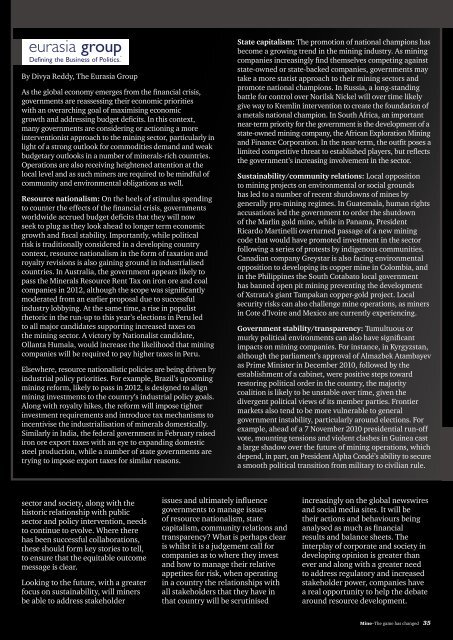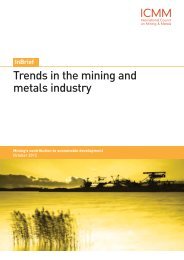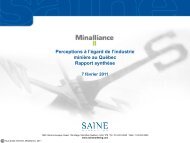You also want an ePaper? Increase the reach of your titles
YUMPU automatically turns print PDFs into web optimized ePapers that Google loves.
By Divya Reddy, <strong>The</strong> Eurasia Group<br />
As the global economy emerges from the financial crisis,<br />
governments are reassessing their economic priorities<br />
with an overarching goal of maximising economic<br />
growth and addressing budget deficits. In this context,<br />
many governments are considering or actioning a more<br />
interventionist approach to the mining sector, particularly in<br />
light of a strong outlook for commodities demand and weak<br />
budgetary outlooks in a number of minerals-rich countries.<br />
Operations are also receiving heightened attention at the<br />
local level and as such miners are required to be mindful of<br />
community and environmental obligations as well.<br />
Resource nationalism: On the heels of stimulus spending<br />
to counter the effects of the financial crisis, governments<br />
worldwide accrued budget deficits that they will now<br />
seek to plug as they look ahead to longer term economic<br />
growth and fiscal stability. Importantly, while political<br />
risk is traditionally considered in a developing country<br />
context, resource nationalism in the form of taxation and<br />
royalty revisions is also gaining ground in industrialised<br />
countries. In Australia, the government appears likely to<br />
pass the <strong>Mine</strong>rals Resource Rent Tax on iron ore and coal<br />
companies in 2012, although the scope was significantly<br />
moderated from an earlier proposal due to successful<br />
industry lobbying. At the same time, a rise in populist<br />
rhetoric in the run-up to this year’s elections in Peru led<br />
to all major candidates supporting increased taxes on<br />
the mining sector. A victory by Nationalist candidate,<br />
Ollanta Humala, would increase the likelihood that mining<br />
companies will be required to pay higher taxes in Peru.<br />
Elsewhere, resource nationalistic policies are being driven by<br />
industrial policy priorities. For example, Brazil’s upcoming<br />
mining reform, likely to pass in 2012, is designed to align<br />
mining investments to the country’s industrial policy goals.<br />
Along with royalty hikes, the reform will impose tighter<br />
investment requirements and introduce tax mechanisms to<br />
incentivise the industrialisation of minerals domestically.<br />
Similarly in India, the federal government in February raised<br />
iron ore export taxes with an eye to expanding domestic<br />
steel production, while a number of state governments are<br />
trying to impose export taxes for similar reasons.<br />
State capitalism: <strong>The</strong> promotion of national champions <strong>has</strong><br />
become a growing trend in the mining industry. As mining<br />
companies increasingly find themselves competing against<br />
state-owned or state-backed companies, governments may<br />
take a more statist approach to their mining sectors and<br />
promote national champions. In Russia, a long-standing<br />
battle for control over Norilsk Nickel will over time likely<br />
give way to Kremlin intervention to create the foundation of<br />
a metals national champion. In South Africa, an important<br />
near-term priority for the government is the development of a<br />
state-owned mining company, the African Exploration Mining<br />
and Finance Corporation. In the near-term, the outfit poses a<br />
limited competitive threat to established players, but reflects<br />
the government’s increasing involvement in the sector.<br />
Sustainability/community relations: Local opposition<br />
to mining projects on environmental or social grounds<br />
<strong>has</strong> led to a number of recent shutdowns of mines by<br />
generally pro-mining regimes. In Guatemala, human rights<br />
accusations led the government to order the shutdown<br />
of the Marlin gold mine, while in Panama, President<br />
Ricardo Martinelli overturned passage of a new mining<br />
code that would have promoted investment in the sector<br />
following a series of protests by indigenous communities.<br />
Canadian company Greystar is also facing environmental<br />
opposition to developing its copper mine in Colombia, and<br />
in the Philippines the South Cotabato local government<br />
<strong>has</strong> banned open pit mining preventing the development<br />
of Xstrata’s giant Tampakan copper-gold project. Local<br />
security risks can also challenge mine operations, as miners<br />
in Cote d’Ivoire and Mexico are currently experiencing.<br />
Government stability/transparency: Tumultuous or<br />
murky political environments can also have significant<br />
impacts on mining companies. For instance, in Kyrgyzstan,<br />
although the parliament’s approval of Almazbek Atambayev<br />
as Prime Minister in December 2010, followed by the<br />
establishment of a cabinet, were positive steps toward<br />
restoring political order in the country, the majority<br />
coalition is likely to be unstable over time, given the<br />
divergent political views of its member parties. Frontier<br />
markets also tend to be more vulnerable to general<br />
government instability, particularly around elections. For<br />
example, ahead of a 7 November 2010 presidential run-off<br />
vote, mounting tensions and violent clashes in Guinea cast<br />
a large shadow over the future of mining operations, which<br />
depend, in part, on President Alpha Condé’s ability to secure<br />
a smooth political transition from military to civilian rule.<br />
sector and society, along with the<br />
historic relationship with public<br />
sector and policy intervention, needs<br />
to continue to evolve. Where there<br />
<strong>has</strong> been successful collaborations,<br />
these should form key stories to tell,<br />
to ensure that the equitable outcome<br />
message is clear.<br />
Looking to the future, with a greater<br />
focus on sustainability, will miners<br />
be able to address stakeholder<br />
issues and ultimately influence<br />
governments to manage issues<br />
of resource nationalism, state<br />
capitalism, community relations and<br />
transparency? What is perhaps clear<br />
is whilst it is a judgement call for<br />
companies as to where they invest<br />
and how to manage their relative<br />
appetites for risk, when operating<br />
in a country the relationships with<br />
all stakeholders that they have in<br />
that country will be scrutinised<br />
increasingly on the global newswires<br />
and social media sites. It will be<br />
their actions and behaviours being<br />
analysed as much as financial<br />
results and balance sheets. <strong>The</strong><br />
interplay of corporate and society in<br />
developing opinion is greater than<br />
ever and along with a greater need<br />
to address regulatory and increased<br />
stakeholder power, companies have<br />
a real opportunity to help the debate<br />
around resource development.<br />
<strong>Mine</strong>–<strong>The</strong> <strong>game</strong> <strong>has</strong> <strong>changed</strong> 35









